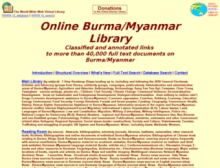Resource information
Conclusions: "Widespread land conflicts and pending land governance reform, also in relation to the larger
ongoing peace process, form the key reason for opposition to the pending EU-Myanmar IPA.
As previously explained, land rights are not well established and populations living or working
on land acquired for large-scale investment projects have protested over forced evictions, loss
of livelihoods, inadequate consultation and compensation. Land governance reform is
expected and wanted, as well as larger governance reform in the context of the peace process,
although the breadth and depth of these remain unknown.
In addition to the need for protection of land-related human rights, and the need for policy
space, Myanmar at present has limited institutional capacity to implement stringent
commitments, due to which it may fail to effectively enforce IPA measures. There is limited
intra-government information sharing and coordination, which could unintentionally expose
the country to expensive litigation risks. Combined with the umbrella clause included in the
agreement, this may increase the vulnerability of host states to litigation under investment
treaties.
Ultimately, a lot of the discussion around investment protection comes down to a political
discussion about development trajectories. Like one respondent also noted, “This IPA will be
fine for Myanmar as long as it wants to continue what starts to look more and more as a
neoliberal development policy. If they stay within the neoliberal paradigm, there will not be
problems. But if one day they want to adopt massive land reform, they will run into
trouble.”164 This also explains the position of some of the private stakeholders consulted, who
emphasize Myanmar simply needs more investment if it wants to reduce poverty, and that
this larger picture may sometimes have to overrule smaller issues. In short, different people
have different visions for Myanmar’s future.
However, given the NLD Economic Policy vision of the government is supposedly “peoplecentred,
and aims to achieve inclusive and continuous development, and that it aims to
establish an economic framework that supports national reconciliation, based on the just
balancing of sustainable natural resource mobilization and allocation across the States and
Region”165, there may indeed be issues with specific IPA provisions in the future, for which
intensified lobby at this stage is warranted...


